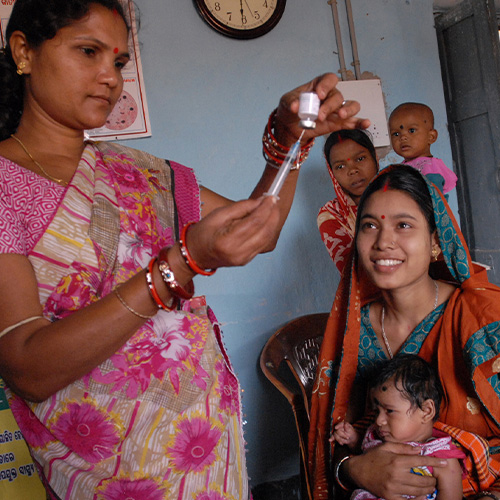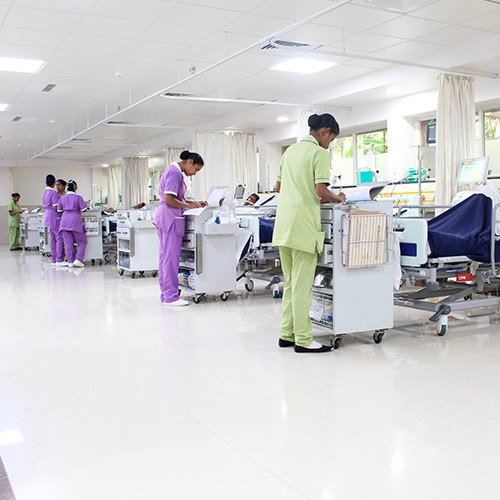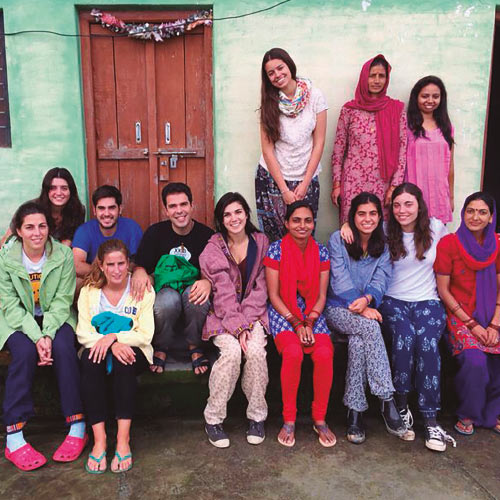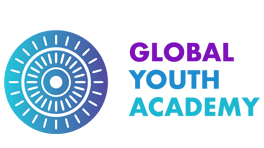Health sciences program in Karnataka, India
- Mangalore and Mysore, Karnataka
- NITTE University in Mangalore
- 3 weeks
- Language: English

Context
Health is a fundamental human right that still remains unrecognised in many countries. It is much more than merely the absence of disease. For example, India has a large health care sector and high-quality health services in major cities. However, in the small towns and villages, accessing appropriate medical care can be a problem.
As a result, we find ourselves in a very unfair situation. There are highly innovative programs with huge investments in research and development in cities such as Bangalore, while in the rural areas, the population does not have access to the most basic services. Women and girls are by far the most vulnerable in this situation.
Learning Objectives
1
2
3
4
Activities
The program is structured in four fundamental pillars that are organised as follows:
- Academic, dynamic and experiential content at NITTE University in Mangalore.
- Professional internships at the NITTE University Hospital.
- Accompanying local doctors in their daily work.
- Volunteering in NGO in Mysore, supporting projects at local clinics, gender projects in health and education.
- Continuous process of research and critical reflection on the experience and content acquired. You will have previously trained at the Global Youth Academy, the online school where you will discover how to actively participate in the 2030 agenda and you will be able to become certified in Global Competences with the AFS Global Competence.
Online training:
All our programmes include online training through our Global Youth Academy e-learning platform that addresses the themes of the United Nations 2030 Agenda and the Sustainable Development Goals (SDGs).
Internship Experience:
During your stay, you will carry out your professional internship at the NITE University Hospital where you will accompany professionals from different specialisations in their patient care, interventions and treatments.
You will also visit rural clinics, carrying out interventions in the field and providing basic health services to nomadic populations in the country.
You will spend 3-4 days a week working in the field with the project assigned according to your profile, getting to know the day-to-day activity, the challenges faced and the impact generated.
Volunteering:
One day a week you will volunteer with local NGOs that work in education and integrate health awareness and education into their daily work, in order to prevent the development of diseases. You will be involved in cultural activities to discover Indian culture, challenges and opportunities in public health.
Critical reflection workshops:
You will participate in workshops and spaces generated in order to reflect on relevant and innovative topics related to this transformative experience.
Cultural activities:
Weekends are reserved for relaxation and fun while exploring a new country and culture. Therefore, we incorporate into the programme a recommended mix of sporting and cultural activities suitable for all interests.
The project includes the following visits which can be extended depending on the availability of the students and the local partner.
- Day trips in Mangalore region to discover the nature and practice sports and outdoors activities.
- 3 days at the end of the course where you will discover local projects and activities such as a safari in the nature reserve and cultural visits such as the Mysore Palace, the Tibetan refugee reception centre and Byalakuppe Buddhist monastery in Mysore.


Acquired Skills
Technical and academic skills
- The healthcare system in India, its challenges and opportunities.
- Different diseases and their treatments in this society and context.
- Medical treatments and specific methodologies in place.
- Interculturality in health sciences.
Intercultural competence
- Competencies to work and interact with different cultures.
- Expand self -knowledge by recognizing strengths and weaknesses.
Systemic Analysis
- To understand the world as a system; the interrelationships,
dependencies and North-South effects. - To develop the ability to establish the connections and subsequent
alliances necessary to create innovative projects.
Sustainability and impact measurement
- To understand the capacity for action on the 2030 Agenda.
- To develop indicators to measure impact from an economic, social
economical and sustainable value.
Innovation in sustainable companies
- To increase the innovative capacity to find solutions to social, economic and sustainable problems.
- To learn the following methodologies as tools to address economic and social entrepreneurship: Lean Startup, Theory of Change in Business Model Canvas, ChangeMaker.
Expected Results
1
Train the next generation of leaders for the creation and management of social and sustainable companies.
2
Train students to implement their own solutions with a social focus and a global vision on a local scale. So that they understand the functioning of successful alliances at these levels and to encourage their capacity for innovation in the face of this great challenge at all levels.
3
Equip students with the necessary skills to identify and solve public health problems in an ethical and sustainable way; and empower them to develop an entrepreneurial spirit in this field based on critical, responsible, committed and creative thinking.
4
Development of indicators to measure the health, social and environmental impact of its actions.
5
Deep understanding of the Sustainable Development Goals and the 2030 Agenda and their transversal application in economic and business activity.
Training
complementary
Global Youth Academy is Lea Global’s e-learning platform that offers training on the United Nations 2030 Agenda and how to adhere, through action, to the different SDGs. All projects include 120 hours of training at the Global Youth Academy, as well as continuous online support on the subject developed.

